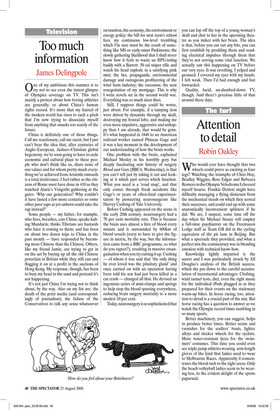Too much information
James Delingpole
One of my ambitions this summer is to try not to see even the tiniest glimpse of Olympics coverage on TV. This isn’t mainly a protest about how boring athletics are generally; or about China’s human rights record. It’s more that my hatred of the modern world has risen to such a pitch that I’m now trying to dissociate myself from anything that smacks too scarily of the future.
China is definitely one of those things. Call me reactionary, call me racist, but I just can’t bear the idea that, after centuries of Anglo–European, Judaeo–Christian global hegemony, we’re soon going to have to cede economic and cultural place to these people who don’t think like us, share none of our values and for whom pretty much everything we’ve achieved from Aristotle onwards is a total irrelevance. I feel rather as the citizens of Rome must have done in 410 as they watched Alaric’s Visigoths gathering at the gates: ‘Why our generation? Why couldn’t it have lasted a few more centuries so some other poor saps as yet unborn could take the rap instead?’ Some people — my father, for example, who lives, breathes, eats China; speaks halting Mandarin; thinks Tibetans are bastards who have it coming to them; and has been on about two dozen trips to China in the past month — have responded by becoming more Chinese than the Chinese. Others, like my friend Jamie, are trying to get in on the act by buying up all the old Chinese porcelain in Britain while they still can and flogging it on at a profit in the auctions of Hong Kong. My response, though, has been to bury my head in the sand and pretend it’s not happening.
It’s not just China I’m trying not to think about, by the way. Also on my list are: the death of the print media (and correspondingly of journalism); the failure of the Conservatives to talk any sense whatsoever on taxation, the economy, the environment or energy policy; the bill for next term’s school fees; my continuous low-level trembling which I’m sure must be the result of something like MS or early-onset Parkinsons; the slowly gathering likelihood that I shall never know how it feels to waste an RPG-toting baddy with a Barrett .50 cal sniper rifle and watch his head explode in a satisfying pink mist; the lies, propaganda, environmental damage and outrageous profiteering of the wind farm industry; the recession; the next renegotiation of my mortgage. This is why I write novels set in the second world war. Everything was so much nicer then.
Still, I suppose things could be worse, just about. For example, if a tamping iron were driven by dynamite through my skull, destroying my frontal lobe, and making me even more impulsive, aggressive and unhappy than I am already, that would be grim. It’s what happened in 1848 to an American railroad worker named Phineas Gage and it was a key moment in the development of our understanding of how the brain works.
One problem with the brain, explained Michael Mosley in his horribly gory but deeply fascinating new history of surgery Blood and Guts (BBC4, Wednesday), is that you can’t tell just by taking it out and looking at it which part serves which function. What you need is a ‘road map’, and that only comes through freak accidents like Gage’s or years of often-fatal experimentation by pioneering neurosurgeons like Harvey Cushing of Yale University.
Before Cushing appeared on the scene in the early 20th century, neurosurgery had a 70 per cent mortality rate. This is because the brain uses almost a litre of blood every minute and is surrounded by 600km of blood vessels (sorry to have to give the figure in metric, by the way, but the information came from a BBC programme, so what do you expect?), resulting in massive exsanguination when you try cutting it up. Cushing — of whom it was said that ‘the only thing he ever loved was the pituitary gland’ and once carried on with an operation having been told his son had just been killed in a car crash — changed all that. He devised an ingenious series of mini-clamps and springs to help stop the blood spurting everywhere, reducing brain surgery mortality to a more modest 10 per cent.
Today, neurosurgery is so sophisticated that you can lop off the top of a young woman’s skull and chat to her in the operating theatre as you tinker with her brain. The idea is that, before you cut out any bits, you can first establish by prodding them and sending electrical impulses through them that they’re not serving some vital function. We actually saw this happening on TV before our very eyes. It was revolting. I yelped and groaned. I covered my eyes with my hands. I felt weak. Then I’d had enough and fast forwarded.
Quality, lucid, un-dumbed-down TV, though. And there’s precious little of that around these days.


























































 Previous page
Previous page